It is challenging to produce robust organoids of the gastrointestinal and respiratory systems that accurately reflect the complex organ environment. High-quality growth factors (GFs) are crucial in this process, including EGF, FGF, Noggin, BMP, and RSPO1.
The development of bronchioalveolar and alveolar organoids is cooperatively induced by FGF10, HGF, and KGF/FGF7. FGF2 and IGF-1 also improve intestinal organoid plating.
Sino Biological offers a broad range of products for these growth factors and their corresponding receptors and activators, including c-MET, HGFAC, FGFR1, FGFR2, and BMPR2. These products support research and development of organoid cultures and various diseases associated with these molecules.
Featured growth factor proteins
Studies have demonstrated that FGF10, HGF, and KGF/FGF7 can promote the development of bronchioalveolar and alveolar organoids. To aid in studying organoid culture, Sino Biological has created high-quality FGF10, HGF, and FGF7. Advantages include:
- High purity
- HPLC verified
- Actively validated
- High lot-to-lot consistency
- Low endotoxin
- Cited by researchers
Human FGF10 protein Cat#: 10573-HNAE
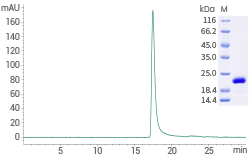
Purity: ≥95 % as determined by SDS-PAGE & SEC-HPLC. Image Credit: Sino Biological Inc.
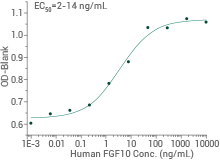
Cell proliferation assay using BaF3 mouse pro-B cells transfected with human FGFR2b. Image Credit: Sino Biological Inc.
Human HGF protein cat#: 10463-HNAS
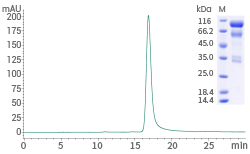
Purity: ≥95 % as determined by SDS-PAGE & SEC-HPLC. Image Credit: Sino Biological Inc.
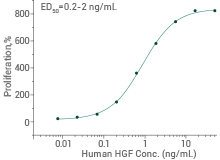
Ability to neutralize TGF-beta mediated inhibition on Mv-1-Lu cell proliferation. Image Credit: Sino Biological Inc.
Human KGF/FGF-7 protein cat#: 10210-H07E
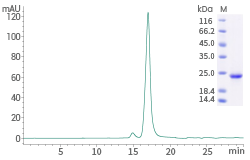
Purity: ≥95 % as determined by SDS-PAGE & SEC-HPLC. Image Credit: Sino Biological Inc.
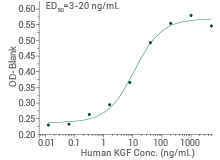
Cell proliferation assay using BaF3 mouse pro-B cells transfected with human FGFR2b. Image Credit: Sino Biological Inc.
More growth factor proteins (partial)
Sino Biological has created a collection of recombinant GFs and associated protein reagents to support the organoid culture of the gastrointestinal and respiratory systems and the investigation of numerous diseases connected to these elements.
Source: Sino Biological Inc.
| Cat# |
GFs |
Species |
Expression Host |
Purity |
Activity |
Endotoxin |
| GMP-10605-HNAE |
EGF |
Human |
E. coli |
≥95% |
Active |
<5 EU/mg |
| 10605-H01H |
EGF |
Human |
HEK293 Cells |
>90% |
Active |
<1.0 EU/μg |
| 10605-HNAE |
EGF |
Human |
E. coli |
≥95% |
Active |
<5 EU/mg |
| 50482-M01H |
EGF |
Mouse |
HEK293 Cells |
>95% |
Active |
<1.0 EU/μg |
| 10014-HNAE |
FGF2 |
Human |
E. coli |
>95% |
Active |
<1.0 EU/μg |
| 10210-H07E |
FGF7 |
Human |
E. coli |
≥95% |
Active |
<0.01 EU/μg |
| 10573-HNAE |
FGF10 |
Human |
E. coli |
≥95% |
Active |
<5 EU/mg |
| 10267-H02H |
Noggin |
Human |
HEK293 Cells |
>95% |
Active |
<1.0 EU/μg |
| 10267-H08H |
Noggin |
Human |
HEK293 Cells |
>95% |
Active |
<1.0 EU/μg |
| 10267-HNAH |
Noggin |
Human |
HEK293 Cells |
>95% |
Active |
<1.0 EU/μg |
| 10426-H01H |
BMP2 |
Human, Mouse, Rat, Rhesus, Canine |
HEK293 Cells |
>95% |
Active |
<1.0 EU/μg |
| 50439-M15H |
BMP4 |
Mouse |
HEK293 Cells |
>92% |
|
<1.0 EU/μg |
| 10214-H01H |
BMP5 |
Human |
HEK293 Cells |
>95% |
|
<1.0 EU/μg |
| 11083-H08H |
RSPO1 |
Human |
HEK293 Cells |
>95% |
Active |
<1.0 EU/μg |
| 11083-H08H1 |
RSPO1 |
Human |
HEK293 Cells |
>98% |
Active |
<1.0 EU/μg |
| 11083-HNAS |
RSPO1 |
Human |
CHO Stable Cells |
≥95% |
Active |
<10 EU/mg |
| 50316-M08S |
RSPO1 |
Mouse |
CHO Stable Cells |
>95% |
Active |
<1.0 EU/μg |
| 10598-HNAE |
IGF1 |
Human |
E. coli |
>95% |
Active |
|
| 50437-MNAY |
IGF1 |
Mouse |
Yeast |
>95% |
Active |
|
| 10616-H08H |
FGFR1 |
Human |
HEK293 Cells |
>98% |
Active |
<1.0 EU/μg |
| 16482-H02H |
FGFR1 |
Human |
HEK293 Cells |
>90% |
Active |
<1.0 EU/μg |
| 50186-M02H |
FGFR1 |
Mouse |
HEK293 Cells |
>97% |
Active |
<1.0 EU/μg |
| 90075-C02H |
FGFR1 |
Rhesus |
HEK293 Cells |
>95% |
Active |
<1.0 EU/μg |
| 10824-H03H |
FGFR2 |
Human |
HEK293 Cells |
>90% |
Active |
<1.0 EU/μg |
| 10824-H08H |
FGFR2 |
Human |
HEK293 Cells |
>97% |
Active |
<1.0 EU/μg |
| 10824-H20B1 |
FGFR2 |
Human |
Baculovirus-Insect Cells |
>90% |
Active |
<1.0 EU/μg |
| 16485-H02H |
FGFR2 |
Human |
HEK293 Cells |
>95% |
Active |
<1.0 EU/μg |
| 16485-H08H |
FGFR2 |
Human |
HEK293 Cells |
>95% |
Active |
<1.0 EU/μg |
| 51128-M02H |
FGFR2 |
Mouse |
HEK293 Cells |
>95% |
Active |
<1.0 EU/μg |
| 10692-H08H |
c-MET |
Human |
HEK293 Cells |
>90% |
Active |
<1.0 EU/μg |
| 10692-H20B1 |
c-MET |
Human |
Baculovirus-Insect Cells |
>90% |
Active |
<1.0 EU/μg |
| 10692-H27H-B |
c-MET |
Human |
HEK293 Cells |
>95% |
Active |
<1.0 EU/μg |
| 50622-M02H |
c-MET |
Mouse |
HEK293 Cells |
>92% |
Active |
<1.0 EU/μg |
| 50622-M08H |
c-MET |
Mouse |
HEK293 Cells |
>90% |
Active |
<1.0 EU/μg |
| 70008-D08H |
c-MET |
Canine |
HEK293 Cells |
>95% |
Active |
<1.0 EU/μg |
| 80004-R02H |
c-MET |
Rat |
HEK293 Cells |
>95% |
Active |
<1.0 EU/μg |
| 90304-C02H |
c-MET |
Cynomolgus, Rhesus |
HEK293 Cells |
>95% |
Active |
<1.0 EU/μg |
| 90304-C08H |
c-MET |
Cynomolgus, Rhesus |
HEK293 Cells |
>95% |
Active |
<1.0 EU/μg |
| 90304-CCCH |
c-MET |
Cynomolgus, Rhesus |
HEK293 Cells |
>90% |
Active |
<1.0 EU/μg |
| 10329-H08H |
HGFAC |
Human |
HEK293 Cells |
>95% |
|
<1.0 EU/μg |
| 10551-H03H |
BMPR2 |
Human |
HEK293 Cells |
>90% |
Active |
<1.0 EU/μg |
Featured antibodies for growth factor
Anti-FGF10 antibody, rabbit PAb cat#: 101637-T44
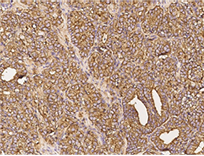
Immunochemical staining of human FGF10 in human prostatic carcinoma tissue. Image Credit: Sino Biological Inc.
HGF neutralizing antibody cat# 10463-mh010
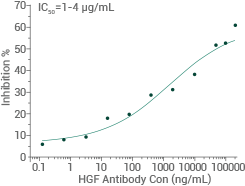
Proliferation of U87 MG cells elicited by autocrine HGF was inhibited by increasing concentrations of Human HGF neutralizing Monoclonal Antibody. Image Credit: Sino Biological Inc.
Anti-c-MET antibody (APC), rabbit MAb cat#: 10692-R243-A
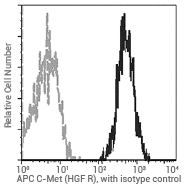
Profile of anti-human C-Met (HGF R) reactivity on HepG2 cells analyzed by flow cytometry. Image Credit: Sino Biological Inc.